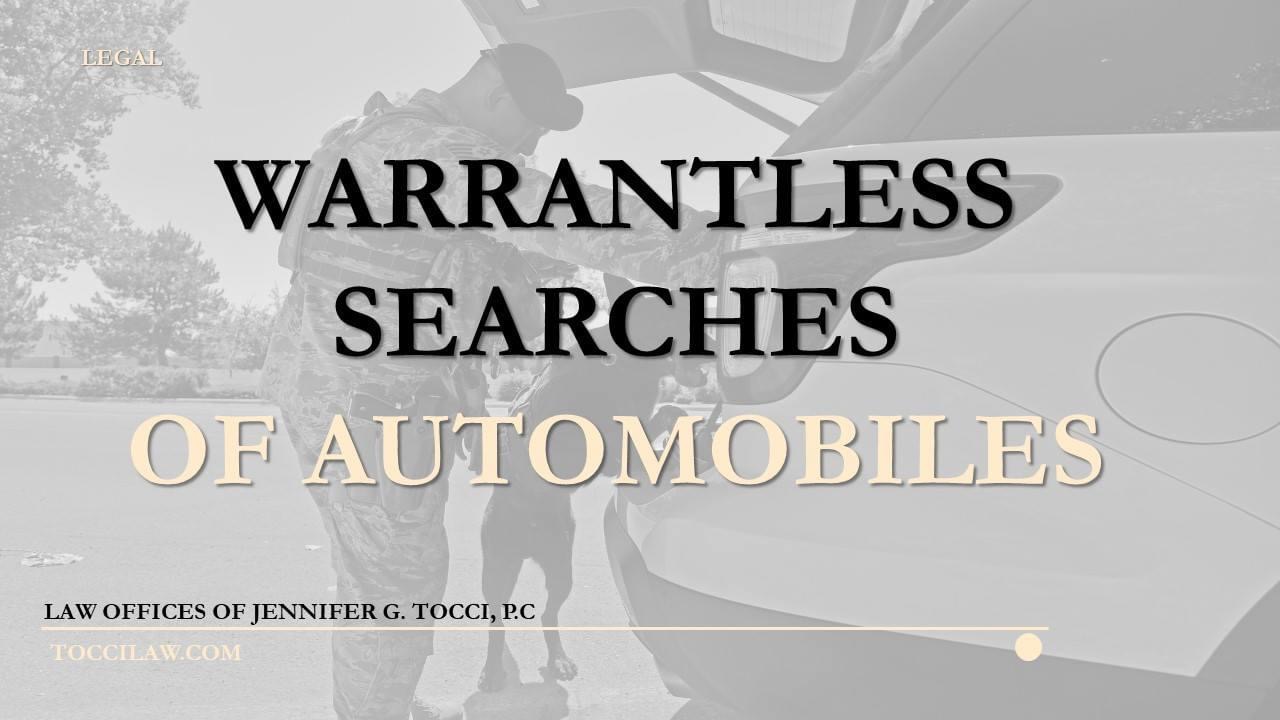Can the Police Legitimately Search My Vehicle Without a Warrant?
It is a misconception that the police cannot search people’s vehicles without a warrant or their consent. However, there are situations in which an officer may search a vehicle without a warrant or consent. In those situations, any items found may be used against you in a court of law.
As American’s we have a Fourth Amendment right to be free from unreasonable searches and seizures. Legally, seizures have been defined as the exercise of control by the government over a person or thing. Searches, for the purposes of the Fourth Amendment, are legally defined as a governmental intrusion into an area where a person has a reasonable and justifiable expectation of privacy. Typically, your home is the place where you are provided the most protection under the United State Constitution. Unlike the search of your home, the police are afforded more freedom to search your vehicle. Cars are considered to have a lower expectation of privacy than someone’s home, therefore giving police officers the “automobile exception.”
This is a brief overview of constitution search and seizure requirements. Every situation is different and even small changes in facts from case to case could greatly change the outcome. If you’ve been accused of a crime, it is important to hire an attorney who you can discuss all of the facts of your case with, so they can be evaluated for legitimacy and whether there are any exceptions or defenses that may apply.
When Stopped/ Pulled Over:
First, stopping a car (or pulling over) is considered a seizure under the Fourth Amendment. When a vehicle is stopped by the police, it is a seizure of the occupants within the vehicle. This includes the driver and all passengers. Typically, the police may not stop your car unless they have at least “reasonable suspicion” to believe that the law has been violated. However, this generally does not apply to cases where an individual or a limited number of vehicles are being stopped. As such, the police are permitted to create roadblocks and stop cars without individual suspicion, so long as there is a neutral and articulable standard for pulling each car over andserve purposes closely related to vehicles (e.g.: drunk driving check points).
When Ordered Out of the Vehicle:
When a police officer has lawfully stopped a vehicle, for safety of the officer, he may order both the driver and the passengers to exit the vehicle. If the police reasonably believe that the driver and/or passengers are armed and dangerous, they may legally frisk the occupants. In addition to the frisk, the police may search the compartments of the vehicle to search for weapons. Any contraband the office discovers during his or her reasonable search of the vehicle may be used against the vehicle’s occupants. Under proper circumstances, the police are permitted to allow narcotics detection dogs to search vehicles.
The Automobile Exception to a Warrantless Search:
The police may search a vehicle without a warrant when they have probable cause to believe it contains contraband or evidence of a crime.
Consent is Provided:
The police are permitted to search a vehicle when consent is provided. The police can pressure an individual to provide consent, even where it has previously been denied. For example, a cop may inform you (truthfully or not) that he will make an arrest for another crime unless consent is provided to search the vehicle. In this case, if consent is provided, the search may be considered lawful, regardless of whether the cop kept his word. Whether lawful consent was provided may be evaluated by your attorney.
Contraband/Evidence in Plain View:
If there is any contraband or evidence of a crime in plain sight in the vehicle, that could give probable cause for the office to search more of the vehicle. Additionally, anything in plain sight is fair game for the basis of an arrest.
If there is an Arrest:
A warrantless search of the interior of an automobile is valid under the law when the police have arrested an occupant in a vehicle and either the arrested person may gain access to the interior of the vehicle orthe officer reasonably believes the evidence regarding the offense the person is being accused of may exist within the vehicle. If the police legally impound the vehicle, they are then permitted to inspect the entire vehicle, including containers inside the vehicle.
Impounding:
The police can also search impounded cars without a warrant. Because the vehicle is now in their possession, they can open any locked compartments, etc. The reason for impounding the vehicle usually does not prevent the authority of the police to search a vehicle, even if it was impounded for a low-level infraction, such as a parking violation.
What is the Scope of a Warrantless Automobile Search?:
When the police have full probable cause to search a vehicle, they are permitted to search the entire vehicle. This includes the trunk and containers in the vehicle. The scope of the search is limited to the type of contraband and evidence seeking to be discovered. Therefore, if the police reasonably suspect the vehicle contains drugs, almost all containers and compartments will be searchable without a warrant. However, if the police are searching for an illegal alien, small compartments may be off limits without consent or other circumstances.
The police are not limited to only searching the driver’s belongings. If the police have a valid right to search a vehicle, that extends to the belongings of passengers as well.
How Do I know If the Police Conducted a Legal Search in My Case?:
Hire a skilled attorney immediately. Subtle changes in facts from case to case may have a drastic impact on the legality. Your attorney will be able to determine whether the police violated the law, and if the scope of their search was legitimate.
While are several factors that allow that police officers to search a vehicle without a warrant, there are still instances where searches are unlawful. If you’ve been accused of a crime, hiring an attorney to evaluate your case could drastically assist in the most favorable outcome. If you’ve been arrested for a crime in Suffolk or Nassau counties, please contact the Law Offices of Jennifer G. Tocci, P.C. at (631) 343-7676.









